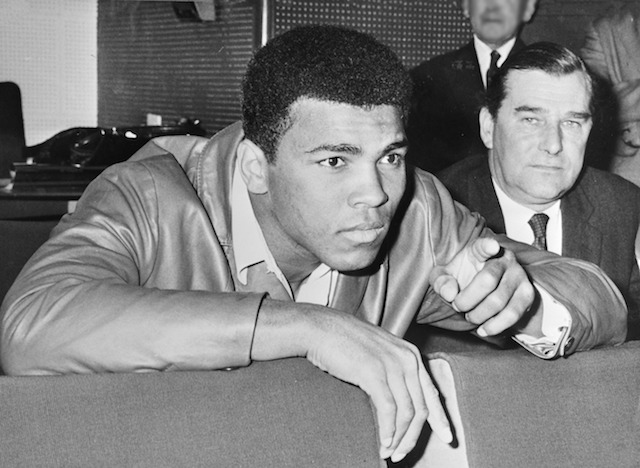Having come to New York City in 1980, fresh off a two year adventure circumnavigating the world, I reckoned this island would have opened for me like a piece of fruit – even if I arrived with only four bucks and an acoustic guitar.
But that first winter was brutal and hard as a Macadamia nut. It started on a good note when I secured a gig at Mills Tavern on Bleecker Street, and crashed at one of the better flophouses on the Bowery. But that ended when I got kicked out for trying to sneak a girl upstairs. Then for awhile I slept in a stairwell down the block from Mills. My days were spent playing the streets of Midtown, for I hadn’t discovered the joys of playing the subway yet. My practice sessions were on nearby park benches.
And it was on one of those dreary and rainy midwinter days where you could see your breath that I met Muhammad Ali. I was doing my scales on a park bench in Bryant Park behind the New York City Public Library’s main branch when I spotted through the bald trees, a limousine pull to a stop along 42nd Street and a large man got out. At first I didn’t recognize him, but then he stepped into the park and began walking towards me, stopping every so often to speak to the street hustlers and homeless.
Within minutes we all recognized it was Muhammad Ali, and even the most hardened street drug hustler ran over giddy as a kid in a playground to greet the three-time heavyweight boxing champion of the world. As for me, I stayed put and continued practicing my scales and watched in amazement as the great Ali – the man who took a courageous stand in opposing the Vietnam War – made eye contact and came over to the bench where I was sitting with a twinkle in his eye. He was wearing a dark, crisp suit, and even though I’d seen him fight on television plenty of times, I was surprised at how tall and broad-shouldered he looked in person.
“What are you playing?” he asked.
“My scales.” I picked out the basic scale on my guitar and sang to it. “Do Re Me Fa So La Ti Do.”
“Do Re Mi Fa So La Ti Do,” he sang back imitating me. “Want to see a magic trick?”
Then Ali made a handkerchief disappear in his hand and reappear out of his side jacket pocket. As he did it the limousine, which let him off at 42nd Street, had pulled around to 40th Street in which the park bench was located and waited at the curb for him. The champ spotted the car and bid me and the street hustlers good-by before completing his walk through the park and getting back in the black limo and driving off.
When I learned Ali died I was sitting in a bar and the first thing I thought about was how he was a true 20th Century icon. A champion of a man who lived a life of courage and conviction and pride and humanity. A religious Muslim man who lived a life well lived.
But most of all, I thought about that dreary midwinter day when I met the great Muhammad Ali, and I sang to him my scales and he showed me a magic trick.






